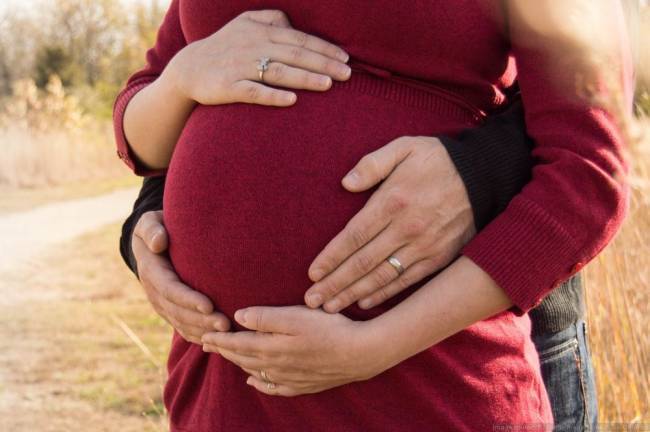So you are into the last third of the pregnancy, also known as the third trimester, which runs from week 28 to birth (months 7–9). You’re planning for the big day in earnest and you’ve probably worked out the 15 fastest ways to the hospital or how to most quickly inflate the birth pool! But what’s going on with your baby and partner?

Here we set out the final changes taking place.
How has the baby developed?
Movement becomes stronger and more frequent as the baby prepares for life outside the womb through improved brain, eye, and muscle function.
- Baby is really starting to gain weight now and starting to look a lot more like a newborn! They will be opening and closing their eyes and also possibly starting to suck their thumb.
- Though size and weight varies, your baby is likely to be over ten inches long, weighs around 2 ¾ lb. The last trimester is where they put on the most of their body weight.
- While baby doesn’t have as much room for gymnastics anymore, they are still doing plenty of kicking. At this point in the pregnancy, it is very important that you both keep monitoring Baby’s movements, and if you think that their movements are slowing down, that you talk to your midwife. Reduced movements can be a sign that Baby is in distress so it is important to be aware.
- Baby’s brain is getting more complicated and he’s becoming sensitive to light and can even tell the difference between sunlight and artificial light.
What’s happening to your partner?
- Physically, this stage of pregnancy can be tough on Mum. She may be experiencing heartburn, constipation, wind, piles, cramps, breathlessness and dizziness. As the skin on the stomach continues to stretch she may have an itchy stomach. She may be getting tired more easily again now, and need to rest or nap more.
- Her womb is pushing against the bottom of her ribcage, which may cause her discomfort.
- Her belly button may be stretched and start to protrude – this is perfectly normal and not permanent.
- As Baby takes up more room, Mum may experience a shortness of breath and increased tiredness.
- As Baby grows, there is more pressure on the bladder, meaning frequent toilet stops or night-time awakenings. So if you are out and about together, and Mum says she needs to go, find her somewhere – and quickly! If she needs to go, she needs to go!
- You may experience late on in third trimester the joys of a nesting Mum – you might find the house cleaned and reorganised, you are likely to be required to finish all those jobs you ‘haven’t got around to yet’ and she may even decide to redecorate the house.
Can I go to antenatal classes?
Antenatal classes provide important information for expectant parents including what happens during labour and birth, preparing for your life with a newborn baby and how to care for them.
- Free classes are run by the NHS in some areas – to find out if there are any available, ask your midwife.
- There are many private classes available which offer lots of different opportunities for you to choose what you learn or how you wish to approach your birth. Find out what is on offer in your local area and choose a class or classes which most appeal to what and how you want to learn about birth and parenting.
- Since October 2014, Fathers and partners have the right to take unpaid time off work to accompany expectant mothers to up to 2 antenatal appointments, which include antenatal classes. If you have already used your time off to attend other appointments, you can still request time off to attend, or take annual leave. Antenatal classes are run over a wide variety of weekdays, evenings and weekends though – so if you cant attend the first ones you find, keep looking around for something else which will suit your individual circumstances. Some antenatal providers will even come to your home and run classes for you at a time which does suit you and your partner.
What goes on at an antenatal class?
What about sex?
Providing your partner has not been told to avoid sexual intercourse by your midwife or doctor, there is no physical reason not to have sex. However, this stage of pregnancy can be uncomfortable for many women, and she may not feel that she wants to, while for other couples sex continues through the pregnancy.
The baby is cushioned by fluids in the amniotic sack and will not be harmed during penetration but if your partner is heavily pregnant certain positions will be impossible!
The Birth Plan
This is your list of preferences about the birth. It includes where you want to give birth, any equipment you want to use (such as a pool, birth ball, etc), who will be birth partner, your preferences about tests and checks you wish to consent to or decline, your preferences about induction, your wishes regarding pain relief and so on.
The birth plan is important as writing it gives you the opportunity to research all your options together. While the plan ultimately is your partner’s preference, it is helpful to discuss the options to make sure you are both clear of the pros and cons of each before making a decision for the plan. If you are to be the birth partner, you are also there to help make sure the plan is listened to and respected, which you can only do if you understand what is on there and why it is!
Birth plan? What’s that all about?
The countdown
While your estimated due date is set on the first day of week 40, remember it is totally normal for the birth to happen any time between 37–42 weeks, as this window of the pregnancy is considered normal term. Although you will have a due date, less than 5% of births actually happen on theirs, and due to this window, your baby is not technically early if born between 37-40 weeks, or late between 40-42 weeks!
On the estimated due date, have something nice planned to do with your partner. It is very common for women to feel a little down if nothing happens on this date (and as you can see, the odds are it won’t) so take her out someone nice – to the cinema or for lunch and make the due date a date where she gets a lovely treat to take the emphasis off waiting!








